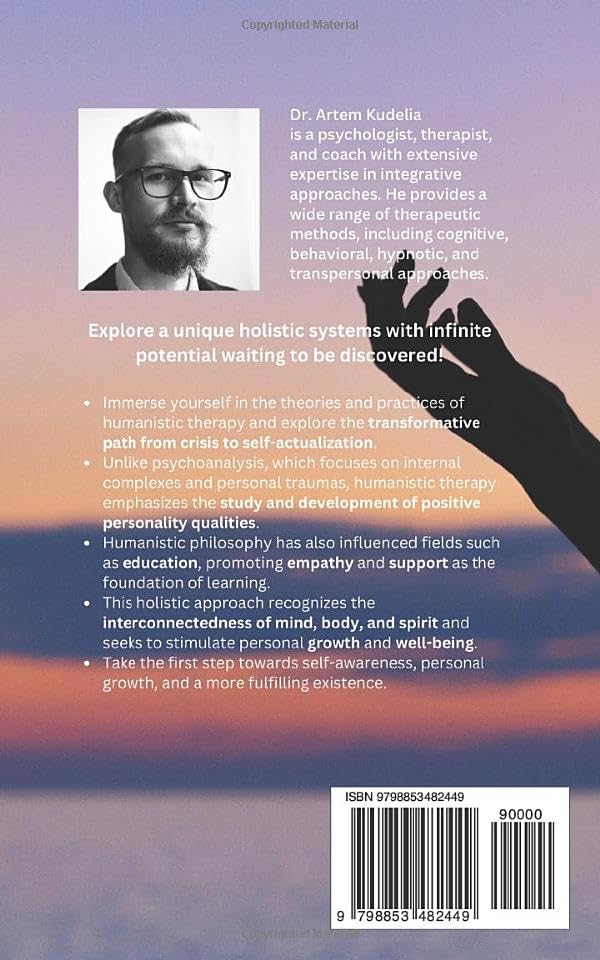


Full description not available





D**E
A compelling description of a major approach to psychological therapy
Striving to understand ourselvesThe better to help us and others in crisesNot just correcting mistakes and problemsBut growing and expanding our real positivesTaking our fate into our own capable handsWe are sympathetic to everyone, even weNot just judging and harshly condemningBut appreciating our many potentialsHere detailing giants of the fieldLovingly tracing their progress…Lives well-lived.
M**A
A solid book built on the thoughts of eminent psychologists
This is a nice book about humanistic therapy. What I loved about this book is that it’s not a classic book written by someone with little knowledge about their own personal experiences. The author is well-read, highly knowledgeable, with a PhD, and discusses the thoughts of eminent psychologists to develop the argumentation. More specifically, the book discusses Maslow’s pyramid of needs and the importance of self-actualization in Maslow’s model. Then, the book brings the perspective of other great psychologists, such as Carl Rogers, Elias Porter, Erich Fromm, James Bugental, and Gestalt therapy. The reader will find a lot of interesting ideas and thoughts, well explained, well discussed, and built not on speculations, but on the serious intellectual work of many psychologists. The book reads very well, too. Sometimes books like these could be difficult to read and have a lot of dense content that might not be easily approachable to many. Instead, the book is easy to follow. The topics are important and rich, yet simple to understand. The reader succeeds in making difficult and important concepts approachable.
S**N
Embracing Growth
This book really impacted me, especially its exploration of Maslow's concept of self-actualization. The book emphasizes the whole nature of people and the potential for growth and self-discovery. It resonated with me as I reflected on my own journey. I found the discussion on the principles of being in the "Here and Now" very enlightening. It urged me to embrace the present moment and let go of past concerns and future worries. The author connects historical figures like Carl Rogers and Abraham Maslow with practical therapeutic approaches, which makes the book both enlightening and actionable. The principles of self-actualization and respect for individuality offered in the text are practical tools that I have immediately put to use in overcoming my own challenges. This book reminds me that our greatest potential lies within us, waiting to be realized through deliberate effort and genuine living.
D**O
Explores the concept of self-actualization
Humanistic therapy goes beyond the therapy room. It's a philosophy that can improve your relationships, education, and overall well-being. Throughout the book, the author emphasizes the importance of empathy and understanding in therapeutic relationships. He echoes Carl Rogers' belief that true understanding comes from seeing the world through the client's eyes, underscoring the humanistic approach's commitment to authenticity and acceptance.
J**K
One of the best overviews of Humanistic Theory that I have read.
When it came to my time in school studying psychology, I could have used this great book that is an incredible overview of the main aspects of the Humanistic Theory. From Maslow to Fromm as well as an overview of the major issues of patients under this method we are able to see one of the best overview books that I have seen without pay several hundred dollars for a college text. If you need a refresher or are just learning the Humanistic Theory for the first time, this is the book for you.I received a free copy of this book via Booksprout and am voluntarily leaving a review.
S**N
humanistic therapy
This book is "humanistic therapy". It is an interesting book and worth checking out if you are into psychology and psychotherapy theories and practices. I received a free copy of this book via Booksprout and am voluntarily leaving a review.
D**L
Humane and Humanistic
Clearly framed, written for the layperson, and yet rigorous in its scholarship as the bibliography demonstrates, I learned from and enjoyed reading this interesting, empowering volume. The adjective, "Humanistic," in the title piqued my attention, and indeed, the philosophies of the variety of renowned psychologists and psychotherapists presented share humanistic rather than religious or doctrinal foundations. The section on Carl Rogers, whom I have long admired, sharpened my understanding of his contribution to the process of self-actualization. But it was the discussion of Everett Schostrom that fascinated me the most. His "Personal Orientation Inventory" is useful to me as I negotiate the conflicting challenges in everyday life. And the definitions within "Misguided Manipulators: clarifies the pathologies of a few real people in my own circle. These thinkers have brought clarity and self-realization to the world and more people should familiarize themselves with their contributions.
S**I
A simple explanation of complicated things
This was an entertaining read. Initially, I liked the writing style, namely the presentation of different points of view combined with the personality of the author. I was interested in learning a little more about the scientists whose theories I had heard. But the main advantage of the book is that it very well reveals the different psychotypes and classifications of personality in a simple and understandable way! And it wasn't boring!I definitely recommend reading this book! If readers are wondering what their peace of mind and well-being depends on, they will love Fromm's information on self-actualization. In any case, everyone will find something interesting for themselves.
Trustpilot
1 week ago
3 days ago